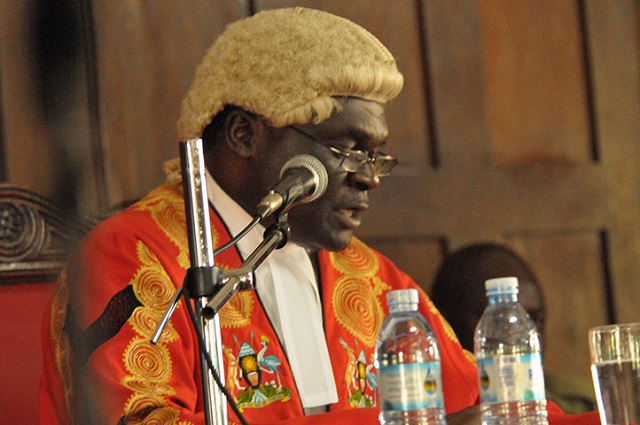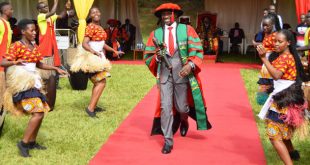
Kampala, Uganda | THE INDEPENDENT | The Judiciary has complained that the government’s policy of “taking services to the people” under decentralization while limiting it to political and administrative services has affected the dispensation of justice in the country.
This was raised by the Chief Justice Alfonse Owiny- Dollo while delivering his speech at the third memorial lecture of the late Chief Justice Benedicto Kiwanuka who was kidnapped and murdered by the soldiers during the era of President Idi Amin.
Owiny-Dollo said the decentralization that includes splitting of districts and counties should not only focus on political and administrative services because as such, the process is incomplete when the courts of law are not included in such decision making policies.
He explained that as a result of splitting districts into many counties, the judiciary still has forty Chief Magistrates courts that are vacant across the country which affects an ordinary person from getting justice.
Uganda currently has some 135 districts with a population of about 45 million people compared to 57 judges who are distributed in various High Court circuits to dispense justice to the citizens.
Unlike in the past when each sub county had a judicial officer, the multiple splits by the government without enhancing the manpower of the Justice system has since left gaps in the dispensation of justice by the judiciary.
“We have situations where a Chief Magistrate has to cover an area covering five magisterial areas; such a judicial officer’s service cannot be well felt by the people or court users”, said Owiny-Dollo.
Owiny-Dollo noted that the situation is very painful especially in High Court circuits saying that the pressure on the Judiciary’s performance must be directed to Parliament and the Executive which are fully empowered instead of expecting the judicial officers to do the impossible with limited capacity.
The main speaker of the day, Dr Kabumba Busingye, a lecturer of Law at Makerere University who delivered the third Kiwanuka memorial lecture called upon the Judiciary to mind about an ordinary person when they are dispensing justice. He argued that ordinary citizens who are the majority in this country need to be reflected or considered in a number of decisions they make instead of being left behind.
Meanwhile, the Minister for Justice and Constitutional Affairs Ephraim Kamuntu tipped the Judiciary to deliver justice very fast in election petitions as the country goes into the election period. In a speech delivered on his behalf by the Deputy Solicitor General Christopher Gashirabake, Kamuntu advised the Judiciary to implore alternative dispute resolution mechanisms to avoid delay of such cases arguing that unresolved cases paralyze the economy and escalate crimes of different categories.
This year’s Benedicto Kiwanuka lecture has been attended by a few people because of the limitations imposed by the Covid-19 pandemic restrictions. In physical attendance were mainly Judiciary staff and a few of his friends led by Dr Paulo Kawanga Ssemwogerere.
In 2018, the 12th Chief Justice of Uganda Bart Katureebe presided over the inaugural lecture and he unveiled a statue of the late Kiwanuka at the main entrance of the Judiciary headquarters.
The monument was placed strategically where Kiwanuka is alleged to have been dragged from as he was being taken by Amin’s soldiers.
48 years since his kidnap and subsequent murder, Kiwanuka’s remains have never been seen again.
******
URN
 The Independent Uganda: You get the Truth we Pay the Price
The Independent Uganda: You get the Truth we Pay the Price


